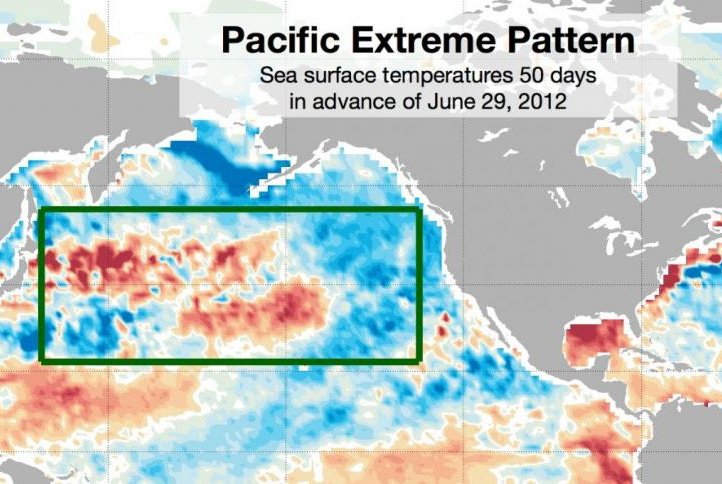A unique sea surface temperature pattern can predict East Coast heat waves several weeks in advance. Photo by UCAR
BOULDER, Colo., March 28 (UPI) -- Meteorologists may soon be able to issue heat wave warnings 50 days out. A new study suggests distinct sea surface temperature patterns predict future heat waves.
Scientists with the University Corporation for Atmospheric Research and the National Center for Atmospheric Research looked at extreme heat data collected from 1,613 weather stations in the Midwest and Eastern United States between 1982 and 2015. They also analyzed corresponding daily sea surface temperatures during the same period.
Their survey uncovered a link between ocean temperatures on the other side of the continent and blasts of extreme heat in the East.
"Whatever mechanisms ultimately leads to the heat wave also leaves a fingerprint of sea surface temperature anomalies behind," Karen McKinnon, a postdoctoral researcher at NCAR, said in a news release.
Prior to East Coast heat waves, scientists identified what they named the Pacific Extreme Pattern. The pattern features a collision between warmer-than-average and colder-than-average sea temperatures.
The starker the Pacific Extreme Pattern, the earlier and more accurately an Eastern heat wave could be predicted.
Using historical data, scientists found that at 50 days out, they could predict increased odds of an East Coast heat wave in a given week, from about 1 in 6 to about 1 in 4. From 30 days out or sooner, scientists could predict increased odds for an East Coast heat wave on a given day, to better than 1 in 2 for especially distinct patterns.
"We found that we could go back as far as seven weeks and still predict an increase in the odds of future heat waves," McKinnon said. "What's exciting about this is the potential for long-range predictions of individual heat waves that gives society far more notice than current forecasts."
Heat waves are often more deadly than major coastal storms, which most people have time to prepare for. Improved predictions and warnings could save lives.
"Summertime heat waves are among the deadliest weather events, and they can have big impacts on farming, energy use, and other critical aspects of society," said McKinnon. "If we can give city planners and farmers a heads up that extreme heat is on the way, we might be able to avoid some of the worst consequences."
The new research was published this week in the journal Nature Geoscience.















